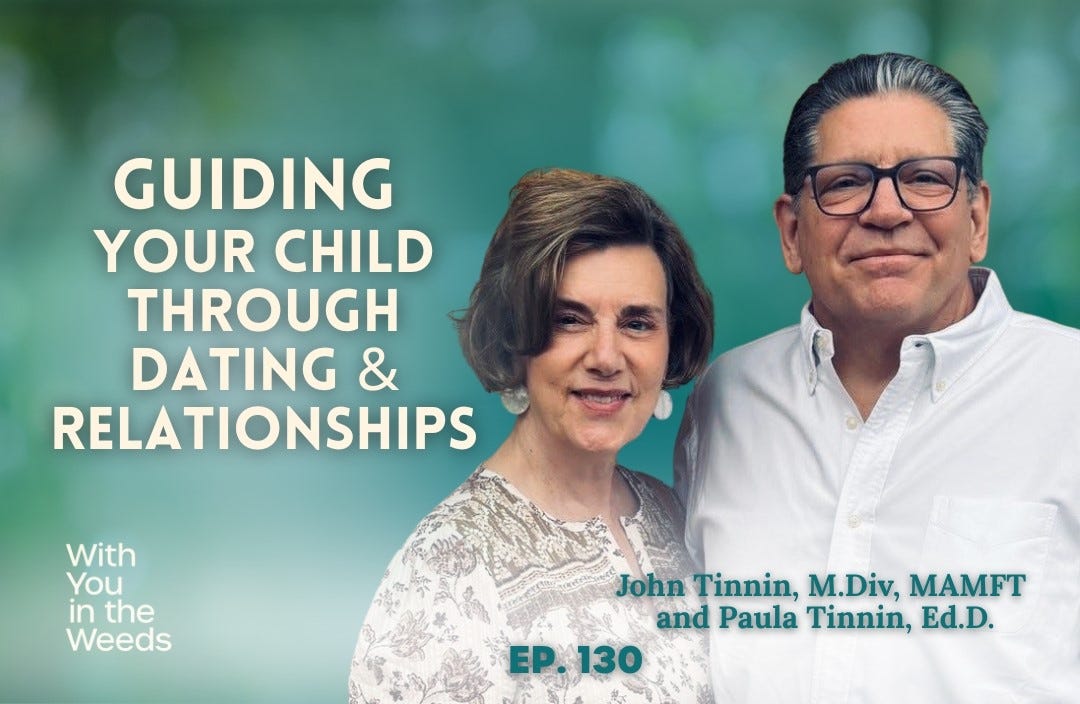Guiding Your Child Through Dating and Relationships
How much influence can you have?
When your child is finally old enough to date, it can be an exciting time – but also a time fraught with worries and concerns. Will they have the discernment to pick a suitable partner? How involved should you be in their dating relationships? And will they be willing to call things off if there is a spiritual mismatch?
In order to address all of these questions and many more, we’ve asked Paula Tinnin - wife to our co-host John Tinnin for over 30 years - to join us on the podcast for the first time. Paula is a mother to two adult daughters, holds a doctorate in education, and is a caregiver to her elderly mother.
In this episode of our ongoing series, Parenting in the Weeds, John and Paula sit down with Austin to reflect on lessons learned from their own dating experiences as well as the advice they gave their daughters when it came to dating and relationships.
Join us as John and Paula share about:
Their own dating and relationship history
Setting healthy boundaries for your children’s dating experiences
Practical guidelines for opposite-sex relationships at every age
Advice for present-day dating dilemmas parents are facing
You’ll want to listen in to hear about John & Paula’s rocky relationship beginnings, their wisdom and practical advice for parents with kids at various ages, and for the informative ‘lightning round’ of current dating questions and answers.
Highlights from the Episode
Starting Early Sets the Foundation
Long before your child is able or interested in dating, you can start communicating important principles to them, like bodily autonomy, self-respect, and God’s design for reserving physical intimacy for marriage.
Initiating conversations about relationships and dating early using age-appropriate language and values will create the open lines of dialogue needed to talk about more serious issues as your child gets older and begins to date.
Guiding Your Child as a Unique Individual
Be ready and willing to change your expectations and boundaries as your kids get older. In addition, different kids need different boundaries and guidelines! If you have a child who is impulsive, strong-willed, and more of a risk-taker, you may need to have more talks with them about the importance of making good decisions – and the consequences of making bad ones.
Every parent has an innate desire and instinct to protect their child. So all the rules and all the relational interactions you have with your child are centered around wanting to protect and help them to flourish and grow. Their differences in personality and temperament mean that ‘protecting’ varies with each child. You need to know where each child is most vulnerable so that you can help them set boundaries for their own protection.
Suggestions for Age-Appropriate Conversations & Boundaries
Elementary & Middle School (Ages 9–12)
Emphasize body autonomy, self-worth, and that physical affection (like kissing) isn’t casual
Caution against equating romantic feelings with readiness to date
It’s okay to have crushes; it’s normal and healthy to be attracted to the opposite sex!
Set firm boundaries early (e.g., no formal dating until high school)
Middle & High School (Ages 13–17)
No solo dates until kids can drive
Encourage open conversations
Set house rules (e.g., curfews, no bedrooms, “kissing is not an activity”)
Teach your child to trust their instincts and respect their bodies
Sit down with boyfriends or girlfriends when necessary to establish expectations
Show your care and interest in their dating lives without being overbearing
Adulthood (18+)
Reinforce independence: financial self-sufficiency required before marriage
Encourage faith-aligned partnerships but show grace during spiritual growth
Emphasize continued influence through relationship and trust
Don’t Panic – But Keep Praying
Christian parenting, particularly when guiding teens and adults through romantic relationships, can be complex and nuanced. At one point, John and Paula’s oldest daughter began dating someone who was not a Christian. Because this scenario mirrored their own past—where Paula had come to faith during their courtship—they approached it with understanding but caution.
Though initially hesitant about the relationship, they observed their daughter navigate it with maturity and thoughtfulness, including her eventual decision to pause dating due to a spiritual mismatch.
Using the strategy of influence rather than control will give your children a chance to grow, make mistakes, and ultimately take ownership of their choices while knowing they are loved and supported.
Using the strategy of influence rather than control will give your children a chance to grow, make mistakes, and ultimately take ownership of their choices while knowing they are loved and supported.
Trusting God with Your Kids
In the end, it really is about trusting that God loves your kids more than you do. Parenting is the hardest job you will ever have, but it's the most wonderful job and the best job you'll ever have.
As challenging as the dating years can be, if you present a united front as parents, maintain consistent, loving boundaries, and humbly acknowledge your own mistakes, your children will come to you with their questions and concerns. It’s never too late to start talking with your kids about relationships – or to repair hurts from the past.
Remember, they will be watching you, so model affection, respect, healthy boundaries, and open communication in your own relationship as well. The only thing better than a perfect parent is a humble parent, and humility goes a long way.




